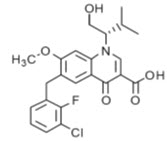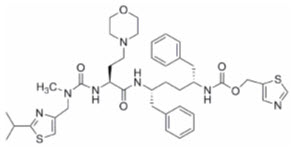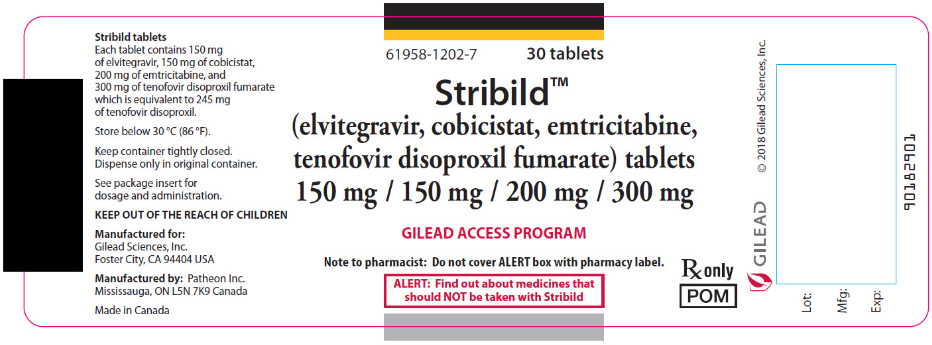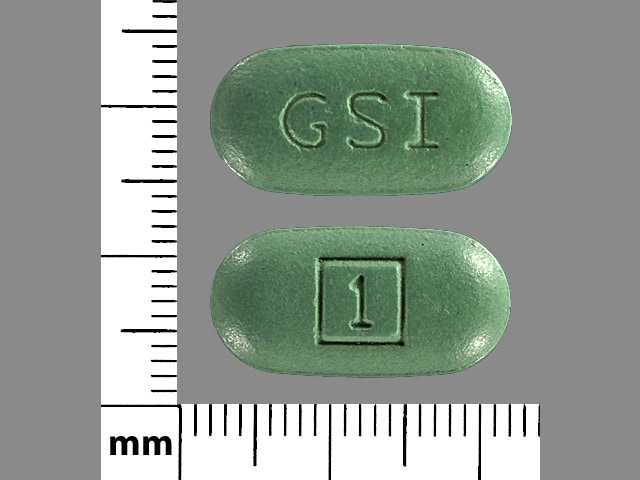Stribild
Generic name: cobicistat, elvitegravir, emtricitabine, and tenofovir
Drug class: Antiviral combinations
Medically reviewed by A Ras MD.
What is Stribild?
Stribild is a prescription medicine that is used without other antiretroviral medicines to treat Human Immunodeficiency Virus-1 (HIV-1) infection in people 12 years of age and older, who have not received anti-HIV-1 medicines in the past, or to replace their current anti-HIV-1 medicines:
It is also used in people who have been on the same anti-HIV-1 medicine regimen for at least 6 months, and who have an amount of HIV-1 in their blood (this is called “viral load”) that is less than 50 copies/mL, and have never failed past HIV-1 treatment.
HIV-1 is the virus that causes AIDS (Acquired Immune Deficiency Syndrome).
Stribild contains the medicines elvitegravir, cobicistat, emtricitabine, and tenofovir disoproxil fumarate.
It is not known if Stribild is safe and effective in children under 12 years of age or who weigh less than 77 lbs.
Description
STRIBILD is a fixed-dose combination tablet containing elvitegravir, cobicistat, emtricitabine, and TDF for oral administration.
- Elvitegravir is an HIV-1 integrase strand transfer inhibitor.
- Cobicistat is a mechanism-based inhibitor of cytochrome P450 (CYP) enzymes of the CYP3A family.
- Emtricitabine is a synthetic nucleoside analog of cytidine. EMTRIVA is the brand name for emtricitabine.
- Tenofovir DF is converted in vivo to tenofovir, an acyclic nucleoside phosphonate (nucleotide) analog of adenosine 5′-monophosphate. VIREAD is the brand name for TDF.
Each tablet contains 150 mg of elvitegravir, 150 mg of cobicistat, 200 mg of emtricitabine, and 300 mg of TDF (equivalent to 245 mg of tenofovir disoproxil). The tablets include the following inactive ingredients: lactose monohydrate, microcrystalline cellulose, silicon dioxide, croscarmellose sodium, hydroxypropyl cellulose, sodium lauryl sulfate, and magnesium stearate. The tablets are film coated with a coating material containing polyethylene glycol, polyvinyl alcohol, talc and titanium dioxide.
Elvitegravir: The chemical name of elvitegravir is 6-(3-Chloro-2-fluorobenzyl)-1-[(2S)-1-hydroxy-3-methylbutan-2-yl]-7-methoxy-4-oxo-1,4-dihydroquinoline-3-carboxylic acid.
It has a molecular formula of C23H23ClFNO5 and a molecular weight of 447.9. It has the following structural formula:

Elvitegravir is a white to pale-yellow powder with a solubility of less than 0.3 micrograms per mL in water at 20 °C.
Cobicistat: The chemical name for cobicistat is 1,3-thiazol-5-ylmethyl [(2R,5R)-5-{[(2S)-2-[(methyl{[2-(propan-2-yl)-1,3-thiazol-4-yl]methyl}carbamoyl)amino]-4-(morpholin-4-yl)butanoyl]amino}-1,6-diphenylhexan-2-yl]carbamate.
It has a molecular formula of C40H53N7O5S2 and a molecular weight of 776.0. It has the following structural formula:

Cobicistat is adsorbed onto silicon dioxide. Cobicistat on silicon dioxide is a white to pale-yellow solid with a solubility of 0.1 mg per mL in water at 20 °C.
Emtricitabine: The chemical name of emtricitabine is 5-fluoro-1-[(2R,5S)-2-(hydroxymethyl)-1,3-oxathiolan-5-yl]cytosine. Emtricitabine is the (-)enantiomer of a thio analog of cytidine, which differs from other cytidine analogs in that it has a fluorine in the 5-position.
It has a molecular formula of C8H10FN3O3S and a molecular weight of 247.25. It has the following structural formula:

Emtricitabine is a white to off-white crystalline powder with a solubility of approximately 112 mg per mL in water at 25 °C.
Tenofovir DF: Tenofovir DF is a fumaric acid salt of the bis-isopropoxycarbonyloxymethyl ester derivative of tenofovir. The chemical name of TDF is 9-[(R)-2-[[bis[[(isopropoxycarbonyl)oxy]-methoxy]phosphinyl]methoxy]propyl]adenine fumarate (1:1). It has a molecular formula of C19H30N5O10P ∙ C4H4O4 and a molecular weight of 635.51. It has the following structural formula:

Tenofovir DF is a white to off-white crystalline powder with a solubility of 13.4 mg per mL in water at 25 °C. All dosages are expressed in terms of TDF except where otherwise noted.
Mechanism of Action
STRIBILD is a fixed-dose combination of antiretroviral drugs elvitegravir (boosted by the CYP3A inhibitor cobicistat), emtricitabine, and TDF
What is the most important information I should know about Stribild?
Stribild can cause serious side effects, including:
- Worsening of Hepatitis B infection. If you have hepatitis B virus (HBV) infection and take Stribild, your HBV may get worse (flare-up) if you stop taking Stribild. A “flare-up” is when your HBV infection suddenly returns in a worse way than before.
- Do not run out of Stribild. Refill your prescription or talk to your healthcare provider before your Stribild is all gone.
- Do not stop taking Stribild without first talking to your healthcare provider.
- If you stop taking Stribild, your healthcare provider will need to check your health often and do blood tests regularly for several months to check your HBV infection. Tell your healthcare provider about any new or unusual symptoms you may have after you stop taking Stribild.
See “What are the possible side effects of Stribild?” for more information about side effects.
Who should not take Stribild?
Do not take Stribild if you also take a medicine that contains:
- alfuzosin hydrochloride
- cisapride
- carbamazepine
- ergot-containing medicines, including:
- dihydroergotamine mesylate
- ergotamine tartrate
- methylergonovine maleate
- lomitapide
- lovastatin
- lurasidone
- midazolam, when taken by mouth
- phenobarbital
- phenytoin
- pimozide
- rifampin
- sildenafil, when used for treating the lung problem, pulmonary arterial hypertension (PAH)
- simvastatin
- triazolam
- St. John’s wort (Hypericum perforatum) or a product that contains St. John’s wort
What should I tell my healthcare provider before taking Stribild?
Before taking Stribild, tell your healthcare provider about all of your medical conditions, including if you:
- have liver problems including hepatitis B infection
- have kidney problems
- have bone problems
- are pregnant or plan to become pregnant
- It is not known if Stribild can harm your unborn baby.
- Stribild should not be used during pregnancy because you may not have enough Stribild in your body during pregnancy.
- Tell your healthcare provider if you become pregnant while taking Stribild. Your healthcare provider may prescribe different medicines if you become pregnant while taking Stribild.
Pregnancy Registry. There is a pregnancy registry for women who take antiviral medicines during pregnancy. The purpose of this registry is to collect information about the health of you and your baby. Talk with your healthcare provider about how you can take part in this registry.
- are breastfeeding or plan to breastfeed. Do not breastfeed if you take Stribild.
- You should not breastfeed if you have HIV-1 because of the risk of passing HIV-1 to your baby.
- At least two of the medicines in Stribild can pass to your baby in your breast milk. It is not known if the other medicines in Stribild can pass into your breast milk.
Talk with your healthcare provider about the best way to feed your baby.
Tell your healthcare provider about all the medicines you take, including prescription and over-the-counter medicines, vitamins, and herbal supplements.
Some medicines may interact with Stribild. Keep a list of your medicines and show it to your healthcare provider and pharmacist when you get a new medicine.
- You can ask your healthcare provider or pharmacist for a list of medicines that interact with Stribild.
- Do not start a new medicine without telling your healthcare provider. Your healthcare provider can tell you if it is safe to take Stribild with other medicines.
How should I take Stribild?
- Take Stribild exactly as your healthcare provider tells you to take it. Stribild is taken by itself (not with other anti-HIV-1 medicines) to treat HIV-1 infection.
- Take Stribild 1 time each day with food.
- Do not change your dose or stop taking Stribild without first talking with your healthcare provider. Stay under a healthcare provider’s care when taking Stribild.
- If you need to take a medicine for indigestion (antacid) that contains aluminum and magnesium hydroxide or calcium carbonate during treatment with Stribild, take it at least 2 hours before or after you take Stribild.
- Do not miss a dose of Stribild.
- When your Stribild supply starts to run low, get more from your healthcare provider or pharmacy. This is very important because the amount of virus in your blood may increase if the medicine is stopped for even a short time. The virus may develop resistance to Stribild and become harder to treat.
- If you take too much Stribild, call your healthcare provider or go to the nearest hospital emergency room right away.
What are the possible side effects of Stribild?
Stribild may cause the following serious side effects, including:
- See “What is the most important information I should know about Stribild?”
- New or worse kidney problems, including kidney failure. Your healthcare provider should do blood and urine tests to check your kidneys before you start and while you are taking Stribild. Your healthcare provider may tell you to stop taking Stribild if you develop new or worse kidney problems.
- Too much lactic acid in your blood (lactic acidosis). Too much lactic acid is a serious but rare medical emergency that can lead to death. Tell your healthcare provider right away if you get these symptoms: weakness or being more tired than usual, unusual muscle pain, being short of breath or fast breathing, stomach pain with nausea and vomiting, cold or blue hands and feet, feel dizzy or lightheaded, or a fast or abnormal heartbeat.
- Severe liver problems. In rare cases, severe liver problems can happen that can lead to death. Tell your healthcare provider right away if you get these symptoms: skin or the white part of your eyes turns yellow, dark “tea-colored” urine, light-colored stools, loss of appetite for several days or longer, nausea, or stomach-area pain.
- Bone problems can happen in some people who take Stribild. Bone problems include bone pain, softening, or thinning (which may lead to fractures). Your healthcare provider may need to do tests to check your bones.
- Changes in your immune system (Immune Reconstitution Syndrome) can happen when you start taking HIV-1 medicines. Your immune system may get stronger and begin to fight infections that have been hidden in your body for a long time. Tell your healthcare provider right away if you start having any new symptoms after starting your HIV-1 medicine.
The most common side effects of Stribild include:
These are not all the possible side effects of Stribild.
Call your doctor for medical advice about side effects. You may report side effects to FDA at 1-800-FDA-1088.
General information about the safe and effective use of Stribild
Medicines are sometimes prescribed for purposes other than those listed in a Patient Information leaflet. Do not use Stribild for a condition for which it was not prescribed. Do not give Stribild to other people, even if they have the same symptoms you have. It may harm them.
You can ask your healthcare provider or pharmacist for information about Stribild that is written for health professionals.
For more information, call 1-800-445-3235 or go to www.STRIBILD.com.
How should I store Stribild?
- Store Stribild at room temperature between 68 °F to 77 °F (20 °C to 25 °C).
- The Stribild container contains a desiccant and has a child-resistant cap.
- Keep Stribild in its original container.
- Keep the container tightly closed.
Keep Stribild and all medicines out of reach of children.
What are the ingredients in Stribild?
Active ingredients: elvitegravir, cobicistat, emtricitabine, and tenofovir disoproxil fumarate
Inactive ingredients: lactose monohydrate, microcrystalline cellulose, silicon dioxide, croscarmellose sodium, hydroxypropyl cellulose, sodium lauryl sulfate, and magnesium stearate. The tablets are film coated with a coating material containing indigo carmine (FD&C blue #2) aluminum lake, polyethylene glycol, polyvinyl alcohol, talc, titanium dioxide, and yellow iron oxide.
Label
PRINCIPAL DISPLAY PANEL – 30 TABLET BOTTLE LABEL
- 61958-1202-7
30 tablets - Stribild™
(elvitegravir, cobicistat, emtricitabine,
tenofovir disoproxil fumarate) tablets
150 mg / 150 mg / 200 mg / 300 mg - GILEAD ACCESS PROGRAM
- Note to pharmacist: Do not cover ALERT box with pharmacy label.
- ALERT: Find out about medicines that
should NOT be taken with Stribild - Rx only
POM


SRC: NLM .
